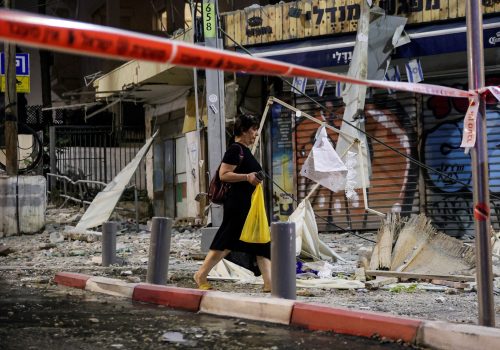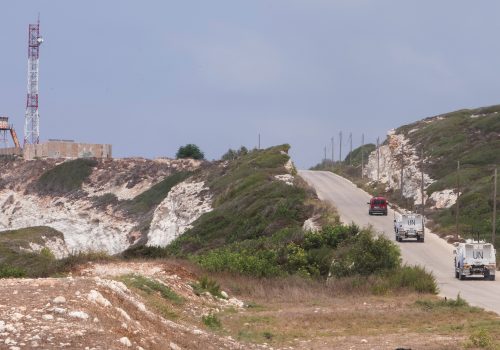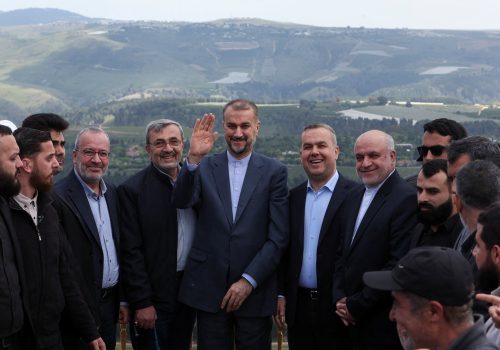Experts react: Israel is ‘at war’ after Hamas militants launch major assault
It’s a new October war. Early Saturday morning, Palestinian militant group Hamas launched its biggest assault on Israel in decades. Thousands of rockets arced from Gaza into Israel; black towers of smoke rose from where they struck. On motorcycles, trucks, and even paragliders, Palestinian militants darted into Israeli communities. Reports indicate that more than a hundred Israelis have been killed, and hundreds more have been injured. “We are at war, not in an operation, not in rounds of fighting—at war,” Israeli Prime Minister Benjamin Netanyahu stated, as Israeli forces began air strikes in Gaza in response to Hamas’s assault.
Below, our experts share their insights on the unfolding events, which come as Israel and Saudi Arabia have been attempting to broker a deal to normalize relations, and nearly fifty years to the day after the 1973 Yom Kippur War, also known as the October War. This article will be updated as the news develops and more reactions come in.
Click to jump to an expert analysis:
Jonathan Panikoff: The Israel-Hamas conflict reaches a new level—and it’s only just beginning
William F. Wechsler: Dispatch from Tel Aviv: A new kind of conflict has begun
Richard LeBaron: For Hamas, the provocation (and the embarrassment to Israel) is the point
Kirsten Fontenrose: If Hamas is trying to shut down Saudi-Israeli normalization, it will backfire
Carmiel Arbit: This is unlike any war we’ve seen in a generation
Ariel Ezrahi: The attack is a pyrrhic victory for Hamas
Danny Citrinowicz: Israel will now prepare for a long campaign in Gaza
The Israel-Hamas conflict reaches a new level—and it’s only just beginning
The attacks on Israel this morning are only the beginning of this conflict. Netanyahu has already promised to “exact a huge price,” and will have little interest in backing down from that vow. This is not going to be a small tit-for-tat; the unparalleled nature of the attack won’t allow for it. Surprise attacks have happened before, and the fact that this one occurred fifty years and one day after the start of the Yom Kippur War is a reference that will be forever etched in the history books. But for years, Israel and Hamas (and other Palestinian militant groups) have engaged in multiple rounds of rocket fire from Gaza and attacks, followed by Israeli responses striking the Gaza Strip.
This is new. It is not the five-thousand-plus rockets that have already been fired from Gaza into Israel over the last twelve hours that’s shocking Israelis and the world. It’s the complexity of what was an extremely well-planned and well-prepared attack in which Hamas terrorists infiltrated Israel by land, by sea, and even by air (via paragliders); embarking on an unprovoked and indiscriminate killing spree of men, women, and children in their homes, on the streets, and even at a nature party in the desert. This was an intelligence failure; it could not be otherwise. It was a security failure, undermining what was thought to be an aggressive and successful layered approach toward Gaza by Israel. But the examination of intel and security failures, which will surely come first, has to take a back seat to the reality of a war that is almost certainly just starting.
Most immediately, the biggest concerns for the Israeli security establishment are almost certainly two-fold: to protect Israeli citizens under siege by Hamas terrorists who have infiltrated the country and to try to prevent Hezbollah from joining the conflict. For years there have been warnings about the potential for a multi-front war. If this is the beginning of one, the potential death and destruction may top anything we’ve seen in decades. While sirens went off to indicate rocket attacks in Jerusalem and Tel Aviv earlier today, the overwhelming majority of the attack is happening in the south of Israel. If Hezbollah enters the conflict, that will no longer be true; Israel will face a country-wide war it has not experienced in decades.
How this conflict, and especially an extended one, impacts long-term efforts to build on the Abraham Accords and possibly normalize relations between Israel and Saudi Arabia will be a critical strategic question. Israel, as is often the case, will have some bandwidth from the international community in the coming days to launch a retaliatory strike. But the longer a war goes and the more carnage there is, the international community will begin to call for all sides to de-escalate. Jerusalem is unlikely to accede to that request unless it views that it has achieved at least some of its objectives. And while Riyadh may be privately supportive of Israel’s efforts to take on Hamas terrorists, the Arab street is not likely to be so supportive, especially as images from television, print, and X (formerly Twitter) highlight death and destruction in Gaza and potentially Lebanon.
The coming days and weeks are likely not only going to drive the future of Israel’s security, but they may well also drive the future of its place in the region.
—Jonathan Panikoff is the director of the Scowcroft Middle East Security Initiative in the Middle East Programs He is a former deputy national intelligence officer for the Near East at the US National Intelligence Council. The views expressed in this publication are the author’s and do not imply endorsement by the Office of the Director of National Intelligence, the Intelligence Community, or any other US government agency.
Dispatch from Tel Aviv: A new kind of conflict has begun
I took the redeye flight from Washington to Tel Aviv on Friday night, preparing to host a historic multilateral conference on regional economic integration with government officials from Israel, the United States, and multiple Arab and Muslim countries. But I arrived here on Saturday to find a country reeling from the most significant surprise military attack in fifty years. Our conference has now been postponed and Israel is girding for war. What a difference a day makes.
Ever since Hamas defeated Fatah in the 2007 Battle of Gaza, only two years after Israeli disengagement from the territory, the rhythm of the Israel-Hamas conflict had become increasingly routine, with regular Hamas terrorism followed by predictable Israeli reprisals. Whenever the destructive cycles became especially violent, outside mediators would help negotiate a temporary ceasefire. Israel would typically accomplish its primary goal of enhancing its security, and Hamas would usually accomplish its goal of presenting itself as the leader of the “resistance.” And the people in Gaza, those who Hamas claims to support, would continue to suffer.
This routine is no more. Hamas has proven itself more operationally ambitious and tactically capable than anticipated. Proportionately, the casualties that Israel suffered today add up to a bigger blow than the one the United States experienced on 9/11. The Israeli military response will reflect that reality, with ground operations accompanying air strikes. The likely result will be a significantly degraded Hamas and substantial destruction within Gaza. And just as 9/11 proved to be a long-term strategic mistake for Al Qaeda, 10/7 will likely prove to be a similar strategic mistake for Hamas.
Read more at the link below.
For Hamas, the provocation (and the embarrassment to Israel) is the point
Why would Hamas launch an unusually ambitious and deadly terror attack against Israel that has already resulted in massive Israeli retaliation and the loss of Palestinian civilian lives? Three reasons:
- Because that’s what Hamas does. The historical reason for Palestinian terror attacks remains the principal rationale: The attacks draw attention to the fact that the conflict between Israel and the Palestinians has not been resolved. From the Palestinian perspective, their situation is getting substantially worse under the right-wing Israeli government.
- The attacks will shift the narrative away from normalization of ties between Saudi Arabia and Israel. Given the unprecedented scale of the operation, planning for these attacks clearly predates perceived recent progress in normalizing ties between Israel and Saudi Arabia. While not likely the main driver of the attacks, Hamas’s actions send a clear reminder to the Saudis that the Palestinian issue should not be treated as just another subtopic in normalization negotiations. For them, it is the only topic.
- The Hamas attacks will earn the group a good deal of respect among Palestinians on the West Bank, where some may be inspired to launch less dramatic attacks. The conditions for a third Intifada are already present. The respect for Hamas’s actions will extend to Arabs in the broader region, even among citizens of those states that have established ties with Israel. The fact that Hamas was able to launch such a serious challenge to Israel will be celebrated, and retaliatory actions by Israel will be condemned.
There will be no winners in this “war.” Hundreds of people will die, and massive destruction will rain down on Gaza once again. But so far, Hamas has managed to badly embarrass Israel’s leadership and its military and intelligence apparatus. For Hamas, that may be enough.
—Richard LeBaron is a nonresident senior fellow with the Atlantic Council’s Middle East Programs. He is a former US ambassador to Kuwait and a former deputy chief of mission at the US embassy in Israel.
If Hamas is trying to shut down Saudi-Israeli normalization, it will backfire
If the attack is an attempt by Hamas or its arms dealer Iran to halt the Saudi-Israeli normalization talks, it backfired. Israel will lock down Gaza with an unprecedented presence and suffocating restrictions. That will be the new baseline from which Riyadh will now have to negotiate the “path forward” for Palestinians that they’ve insisted on during talks with Israel. Hamas has done a disservice to all Palestinians.
Saudi Arabia reacted to the attack by stressing the need to address Palestinian grievances. But international opinion is predominantly with Israel as the victim of this re-sparking of violence. Saudi Arabia, in its role as godfather of Muslims globally, could choose to invite civilian leaders from Gaza to Riyadh now, to hear them out as talks with Israel continue. But the agenda will be centered on a future Gaza without Hamas, and that will be a non-negotiable starting point.
Israel has to be careful not to hand Iran and Hamas the deal-spoiling win they want by responding militarily in ways that result in the mass deaths of uninvolved Palestinians and make it impossible for Saudi Arabia to sidestep those actions in pursuit of an integration deal.
—Kirsten Fontenrose is a nonresident senior fellow in the Scowcroft Middle East Security Initiative and former senior director for the Gulf on the US National Security Council.
This is unlike any war we’ve seen in a generation
The magnitude of the tragedy unfolding in Israel today is unprecedented. Hamas has dealt a historic blow to Israel, infiltrating Israeli homes, holding civilians hostage, and cheering the destruction. It is not yet clear in these early hours if and in what ways this will escalate—whether Palestinians in the West Bank or inside Israel will heed the calls to join arms or whether Israel’s enemies in the north such as Hezbollah will join in. But one thing is clear: The response from Israel in Gaza will be sweeping and devastating. This is unlike any war we’ve seen in a generation.
The timing should come as little surprise. Netanyahu has divided Israeli society and undermined force readiness. The events that are transpiring now reveal major weaknesses in Israel’s intelligence services. Discontent has been brewing in Gaza. And at the same time, Palestinians have feared losing a voice in Saudi-Israel-US negotiations. They have certainly found one now.
—Carmiel Arbit is a nonresident senior fellow for Middle East Programs and the Scowcroft Middle East Security Initiative at the Atlantic Council.
The attack is a pyrrhic victory for Hamas
Last month, I flew from my home in Berlin to participate in a closed event at Sha’ar HaNegev, on the border with Gaza. The event organized by the Israel Policy Forum and others was centered on solutions for the energy and water crisis and the importance of finding ways for the Israeli and Gazan communities to cooperate on common threats in the face of climate change. The event included mostly key members from the international community as well as representatives from the Israel Defense Forces and from Gaza. One of our hosts on the day was Ophir Liebstein, the legendary head of Sha’ar HaNegev Regional Council. Liebstein spoke passionately about the need to promote renewable energy projects along the border with Gaza and also to ensure that his neighbors in Gaza have adequate electricity and water. He was acutely aware of the common challenges facing the communities on both sides of the border. Today, he was tragically killed while bravely defending his hometown from Hamas terrorists who infiltrated Israel. He left a wife and four children behind.
Members of the international community were inspired by people like Liebstein, who was a forward-thinking man of peace while realizing the reality of the difficult security and political situation.
Over the years, the Palestinian Authority and the Israelis have jointly developed major projects for dealing with Gaza’s energy and water crisis, with financial and political support from the international community. Hamas’s actions today put all this at risk.
It is not clear what Hamas thought it would achieve in this war. Hamas’s actions will not serve the Gazan civilians. As the human tragedy is unfolding, Israelis are wondering about the colossal security failure of the Netanyahu government and about what is to come.
—Ariel Ezrahi is a nonresident senior fellow with the Atlantic Council’s Middle East Programs.
Israel will now prepare for a long campaign in Gaza
Hamas launched a military campaign against Israel in an unprecedented and surprising attack. In a well-coordinated operation that included massive rocket fire at Israel, Hamas forces succeeded in penetrating dozens of villages and outposts on the Gaza border, killing more than a hundred people, and kidnapping dozens, including soldiers, old men, and children. Hamas took official responsibility for the attack, and the head of Hamas’s military wing, Mohammad Deif, claimed it was revenge for Israel’s actions at the Al-Aqsa Mosque.
The full size of the event is not yet known, but it is already by far one of the most challenging attacks Israel has seen in all its years. Now Hamas is trying to maximize the achievement—the extent of which it was likely surprised by—by attempting to involve other arenas in the campaign, including by focusing on Israel’s northern border and within Israel. At the same time, Hamas is likely preparing to bargain for the release of its members in Israeli prisons in exchange for the Israelis it has abducted. Hamas is likely also preparing for an Israeli ground campaign.
Israel appears to have suffered a tactical and operational failure: There seems to have been no intelligence information ahead of these attacks. Even worse, Israel’s entire strategy regarding the Gaza Strip appears to have collapsed. The Israeli leadership preferred to strengthen Hamas at the Palestinian Authority’s expense, thinking that the differentiation between the West Bank and the Gaza Strip would inevitably prevent the establishment of a Palestinian state.
Now, Israel faces a wide range of dilemmas. First, Israel is attempting at all costs to prevent the spread of the campaign to additional arenas. On top of that, Israel has to decide whether its forces will enter the Gaza Strip (a step it has previously sought to avoid) and whether it will seek to overthrow the rule of Hamas while an unprecedented number of Israeli captives are in Gaza.
We are only at the beginning of the campaign, and it isn’t easy to know how it will develop. But it is clear that there will be long weeks of fighting ahead, and it may spill over from Gaza to other areas. In this sense, US President Joe Biden’s statement following the attacks was critical because it strengthened the Israeli desire to focus on Gaza and may help to deter Hezbollah from entering this campaign.
The next step is a severe Israeli attack on the Gaza Strip, but it is essential that before this attack, Israel defines precisely what its purpose is. What Israel will do in the coming days and weeks will affect not only Gaza but also what is happening in other arenas.
—Danny Citrinowicz is a nonresident fellow with the Atlantic Council’s Middle East Programs and a fellow at the Institute for National Security Studies. Follow him on X, formerly Twitter, at @citrinowicz.
Further reading
Wed, Sep 27, 2023
Hezbollah’s assertive posture in south Lebanon places UNIFIL in a difficult position
MENASource By Nicholas Blanford
Not only has there been an uptick in activity in recent months along the Blue Line, but Hezbollah has also been establishing a new and visible military footprint.
Fri, Sep 15, 2023
A Saudi-Israeli deal is not happening just yet. But there are other ways to expand the Abraham Accords.
New Atlanticist By Katherine Walla
Officials convening at the US Capitol discussed the economic and cultural projects that can expand the Accords' impact and spread prosperity in the Middle East.
Thu, Jul 6, 2023
Hezbollah and Iran have opened a fourth battlefront: Inside Israel
IranSource By David Daoud
Critical as recent developments may prove, they obscure a more dangerous Hezbollah initiative to establish a proxy foothold inside Israel.
Image: A man runs on a road as fire burns after rockets were launched from the Gaza Strip, in Ashkelon, Israel October 7, 2023. REUTERS/Amir Cohen



